Many of you already appreciate the use of aromatherapy for improvement in emotional patterns, as well as a direct pattern interrupt when choosing better behaviors as a habit. I often call a prescription bottle with a cotton swab or ball dipped in an essential oil everyday aromatherapy. This is a handy item to keep in purse, briefcase, desk drawer, or on the nightstand. A simple whiff can be good for what ails you…
Essential oils (also called volatile or ethereal oils, because they evaporate when exposed to heat in contrast to fixed oils) are odorous and volatile compounds found only in 10% of the plant kingdom and are stored in plants in special brittle secretory structures, such as glands, secretory hairs, secretory ducts, secretory cavities or resin ducts (Ahmadi et al., 2002; Bezić et al., 2009; Ciccarelli et al., 2008; Gershenzon et al., 1994; Liolios et al., 2010; Morone-Fortunato et al., 2010; Sangwan et al., 2001; Wagner et al., 1996). (See The Benefits of Therapeutic Oils)
According to Sarah A. LoBisco, ND, examples of actions of various constituents in an essential oil include the following:
- anti-inflammatory (esters, alcohols, and oxides)
- analgesic (lactones)
- spasmolytic (aldehydes and phenols)
Cleveland Clinic website posts this information: “The scents released by the oil act on the hypothalamus, a part of the brain that influences the hormonal system.” The benefits of essential oils are truly much more than most people realize. You might appreciate this website with helpful basic information, including when it may be best to use a carrier oil to dilute the essential oil for topical use.
My Healing Touch colleague, Linda L. Smith, also has a book about oils and touch. It is called Healing Oils, Healing Hands. Some of the most common essential oils used are lavender, peppermint, sandalwood, rosemary, chamomile, and tea tree. While there some generally agreed upon reports regarding the properties and uses for oils, as with most things in life, responses to smells can also be highly personal.
This week, notice how much your olfactory sense is connected to your sense of well-being. If it seems wise to you, decide to integrate the therapeutic use of essential oils into your self-care.
This week’s health tip originally appeared online at https://scs-matters.com/essential-oils/
While there, you can sign up to receive posts automatically.
Tips from 5 April 2010 to 6 August 2012 are here: Archived Tips
 |
Rev.Debra Basham
Voice: (269) 921-2217 Email: debra@scs-matters.com https://scs-matters.com http://ImagineHealing.info http://SurgicalSupport.info Small Changes … Infinite Results™
“If we have no peace, it is because we have forgotten that we belong to each other.” ~Mother Teresa |

